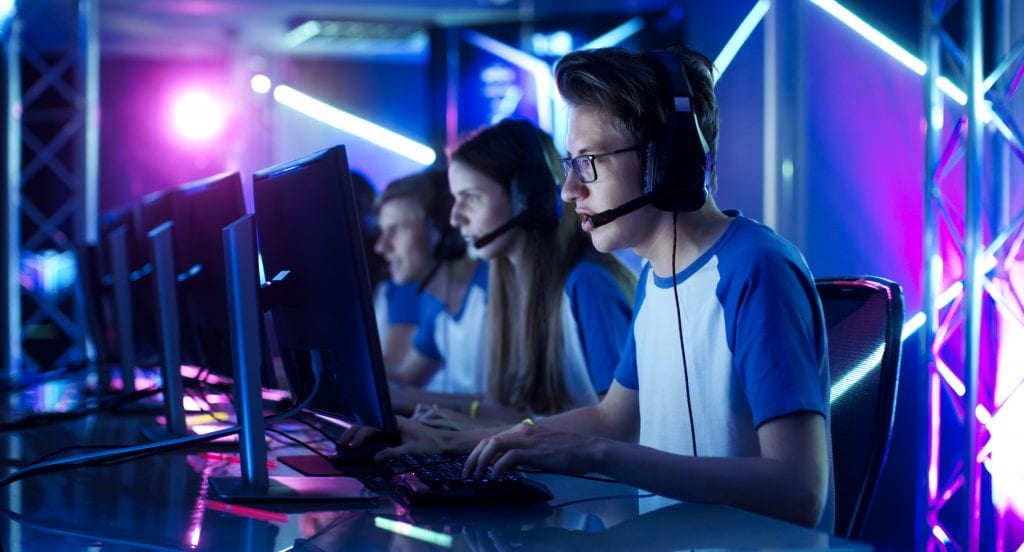
Top 10 Myths about esports

Esports is sweeping the nation. The viewership and revenue have seen exponential growth over the past few years. And this year, Grace College is joining in on the fun. Head coach Andrew Palladino will lead the program in its inaugural season. Learn more about the new program, and hear from coach Palladino here.
As a relatively new sport, there are plenty of myths and misconceptions that are floating around, and we want to clear those up for you! We are out to dispel these myths and share the facts about esports at Grace.
Myth #1: Video games are just a fad.
If you do a little bit of research on this you will quickly find that esports is not going anywhere. According to one study released by Electronic Entertainment Design and Research, “about 67% of Americans, or roughly 211 million people, play video games on at least one type of device, with more than half of those who game playing on multiple platforms.”1 Even more incredible is that in 2016 the games earned more global viewers than the regular NFL season.2
There is even talk of esports making its debut in the Olympics in the future. In short, esports is here to stay.
Myth #2: Video games are just for kids.
Many people think that the majority of gamers are young teenage boys. This is not actually the case. According to statista.com, the average professional esports player spans between the age of 24 and 27.3 It is speculated that those who played games as kids grew up and continued playing as a hobby in adulthood.
Myth #3: Online gaming is not a sport.
While the physical demands are very different than your average sport, there are a lot of characteristics of esports that mirror those of basketball, soccer or baseball! Similar to other varsity sports, esports scholarships (in addition to the many other scholarships available) are offered based on students’ ability. There will be structured practices and team expectations set each season. And as a competitive sport, there are the same pressures that players face on a regular basis: competing at a high level, working with teammates, understanding and owning one’s mistakes, and self-reflecting after a game or practice. If you still aren’t sold; esports does have its own homepage on ESPN.4
Myth #4: Esports promote isolation and cause individuals to hide out in their parents’ basement.
It is a common concern that video games are highly individualistic, leading students to choose a computer screen over socializing in person. We would be naive to say that this is never true, considering there are many video games that are story-driven and exclusively single player. However, the games used for esports are competitive games that involve teamwork and communication. In fact, a Washington Post University of Massachusetts Lowell poll released in 2018 found that more than half of teens or young adults play or watch games with friends they know from other activities.5
In addition, the idea of a student playing alone in his/her parents’ basement is far from the reality of collegiate esports. Grace practices and games will always take place collectively with teammates sitting side by side. Gamers compete in fully outfitted gaming centers, decked out with the newest consoles, high powered computers, and quality head-phones to ensure the team is operating at its highest potential. At the onset of its season, Grace esports will practice and compete at SuperGeeks & Gaming. As the program grows, Grace will look to create a space for esports on campus.
Myth #5: All video games are violent.
Not all games promote violence. Grace College will be monitoring the games that are played and will not allow any M-rated games.
Myth #6: Esports can be spelled a number of ways.
E-Sports, eSports, E-sports, and e-sports–they’re all referring to the same thing, right? Actually, wrong! There are many ways people try to spell it, but in 2017 the Associated Press published the official spelling as esports or Esports, making it a common noun in our everyday conversation.6 Which takes us back to the proof that dispels myth #1–esports is not going away anytime soon.
Myth #7: Esports will pull college students away from their studies.
As a player on the Grace esports roster, there will be a minimum GPA requirement. (The same standard that all Grace athletes are held to.) If coursework is being compromised because of gaming, there will be consequences for the player, just like other collegiate sports. However, there have been studies done that report evidence for why educators should embrace esports.7 Esports have a way of bringing concepts in STEM courses to life, “Students are learning how to analyze gameplay data in order to improve their skills. They’re realizing that basic math and comparison metrics give them a whole new understanding of the game.”8 In accordance with these studies, gaming can actually be a reinforcement of what is being learned in the classroom rather than a distraction.
Myth #8: Esports don’t need to hold practices.
There is a lot of strategizing involved in gaming. Fast-paced games like League of Legends, (Grace’s first organized game) are teaching students how to shift their focus from a negative reaction to loss to a proactive desire to figure out what went wrong and how to fix it. To this end, there will be organized practices run by coach Palladino. At the practices, the team will review their games, and create game plans to correct the mistakes they’ve made in the past.
Myth #9: Coaches are unnecessary.
Coaches play an important role in finding success in esports. They must have a vast knowledge of the games and how they work. Take League of Legends for example; the game currently has 148 different characters with unique attributes, strengths, and weaknesses, and that number continues to rise. Before each game there is a “draft phase” in which coach advising is crucial. The coach helps the players devise an offensive and defensive strategy for the game. Because coach Palladino has 9 years of experience playing League of Legends, he will have invaluable insight as the players prepare for each game of a tournament. In addition to crafting a strategy for each game, coaches are responsible for cultivating a positive team culture and encouraging team cohesion.
Myth #10: Christians should not be involved in esports.
Like any other sport, esports are not inherently bad. Are there ways that video games can be abused? Sure there are. But as believers, we have the redeeming knowledge of the Gospel. One day, all things will be made new, and we have the opportunity to partner with Christ in his work of redemption. By demonstrating great sportsmanship and playing with integrity, esports can be a platform to share Christ with those who don’t know him. This will be the foundation of Grace’s esports program.
If you are interested in joining Grace’s esports team, email coach Palladino at esports@grace.edu.
